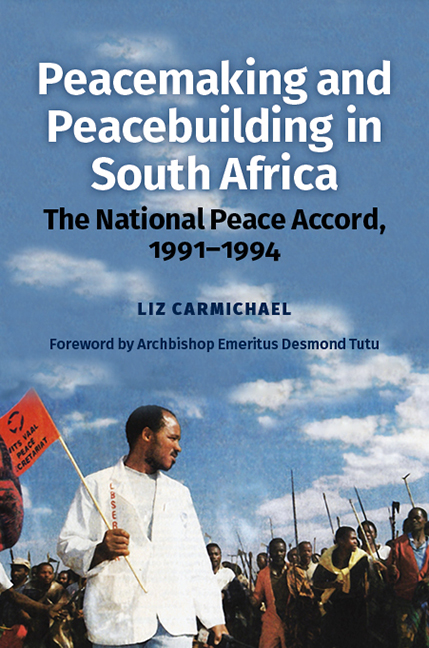Book contents
- Frontmatter
- Dedication
- Contents
- List of Illustrations
- List of Abbreviations
- Glossary
- Acknowledgements
- Note on Nomenclature
- Transition Timeline
- Foreword
- Introduction
- Part One Peacemaking, Peacebuilding, and the South African Conflict
- Part Two Peacemaking
- Part Three Peacebuilding
- Conclusion: Impact and Unfinished Business
- Bibliography
- Index
8 - Negotiating the National Peace Accord: The Process
Published online by Cambridge University Press: 08 October 2022
- Frontmatter
- Dedication
- Contents
- List of Illustrations
- List of Abbreviations
- Glossary
- Acknowledgements
- Note on Nomenclature
- Transition Timeline
- Foreword
- Introduction
- Part One Peacemaking, Peacebuilding, and the South African Conflict
- Part Two Peacemaking
- Part Three Peacebuilding
- Conclusion: Impact and Unfinished Business
- Bibliography
- Index
Summary
Introduction
The National Peace Accord was negotiated, and the National Peace Convention planned, in just three months, chiefly the hectic weeks 11 July to 14 September 1991. The Preparatory Committee aimed to bring about ‘consensus amongst the three major parties on a Peace Agreement which can be endorsed by other interest groups at a national convention and implemented nationally, regionally and locally as a matter of urgency’. It established four Working Groups to negotiate the agreements, and a fifth, the ‘Process Group’, to coordinate the work, compile the Accord, and plan the signing ceremony. This chapter looks at the peacemaking process, the next at the negotiation of the agreements.
The Preparatory Committee
At 7pm on Monday 24 June ten facilitators, ten negotiators and three supporting staff – Val Pauquet, Theuns Eloff and his PA Pam Saxby – gathered at Barlow Park.
The ANC-Alliance sent Thabo Mbeki, Aziz Pahad, Jayendra Naidoo and Sam Shilowa; the IFP, Frank Mdlalose, Walter Felgate and Suzanne Vos; and the NP/ Government, two Deputy Ministers: Roelf Meyer (Constitutional Affairs) and Johan Scheepers (Law and Order), and Constitutional Adviser S. S. (Fanie) van der Merwe.
The facilitators present were John Hall, Jabu Mabuza, Bobby Godsell, Sean Cleary, Louw Alberts, Johan Heyns, Gerrie Lubbe, Ron Steele (for McCauley), Tom Manthata (SACC, for Frank Chikane) and Paddy Kearney (Diakonia Ecumenical Centre, Durban; Natal Church Leaders Group, possibly for Khoza Mgojo). Absent were Motsuenyane, Tutu, Chikane, and Mgojo.
This ‘Preparatory Committee’ met on six evenings between 24 June and 12 September. The CBM supported it with space and staff in its own offices. For the churches, Val Pauquet worked from home. The government gave increasing assistance through its Constitutional Development Service (CDS). Funds came initially from the CBM, then the government shouldered responsibility.
The CDS, based at 260 Walker St, Pretoria, was not yet a full Department but had a Minister in Gerrit Viljoen, a Deputy Minister in Roelf Meyer, and a director in ‘Constitutional Adviser’ Fanie van der Merwe. An unusual government asset, it was originally established to service P. W. Botha's constitutional plans, and now existed to facilitate political change.
- Type
- Chapter
- Information
- Peacemaking and Peacebuilding in South AfricaThe National Peace Accord, 1991-1994, pp. 124 - 143Publisher: Boydell & BrewerPrint publication year: 2022



